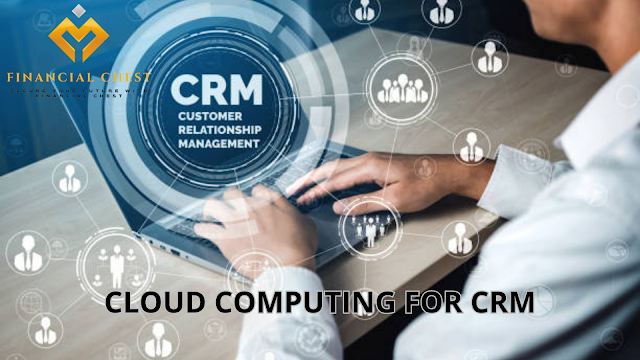CLOUD COMPUTING FOR CRM
 |
| CLOUD COMPUTING FOR CRM |
CLOUD COMPUTING FOR CRM
Using cloud-based tools and services to manage and simplify customer interactions, sales processes, marketing campaigns, and customer data is known as customer relationship management (CRM) in the context of cloud computing. Comparing this strategy to conventional on-premises CRM systems, it has a number of benefits. An overview of cloud-based CRM is given below:
Infrastructure based in the cloud
Cloud CRM solutions are accessed online and housed on distant servers. As a result, businesses are no longer required to manage and maintain their own software and hardware infrastructure. Server provisioning, maintenance, security, and upgrades are handled by cloud service providers.
Scalability
Cloud CRM solutions can scale easily to accommodate changing business needs. Organizations can adjust their subscription plans to add more users, storage, and features as their requirements grow, without the need for significant upfront investments.
Accessibility and Mobility
Cloud CRM allows users to access the system from anywhere with an internet connection, enabling remote work and mobility. This is especially useful for sales teams, customer support agents, and employees who need to interact with customer data on the go.
Cost Savings
Cloud CRM solutions typically operate on a subscription-based model, which can help organizations avoid large upfront costs. Costs are spread out over time, and organizations only pay for the resources and features they actually use.
Updates and Maintenance
Cloud CRM providers handle software updates, security patches, and maintenance, ensuring that the system is up-to-date and secure without requiring significant effort from the organization's IT team.
Integration
Cloud CRM systems often offer integrations with other cloud services, applications, and tools, allowing organizations to create a unified ecosystem and streamline their business processes.
Collaboration
Cloud CRM fosters collaboration among team members by providing a centralized platform for sharing customer information, communication histories, and task assignments.
Data Security
Reputable cloud CRM providers implement robust security measures to protect customer data. They typically employ encryption, access controls, authentication mechanisms, and compliance certifications to ensure data privacy.
Customization and Flexibility
Many cloud CRM systems offer customization options to tailor the software to the organization's specific needs. This can include creating custom fields, workflows, reports, and dashboards.
Vendor Management
With a cloud CRM, the vendor handles technical aspects such as updates, backups, and security. This allows the organization to focus more on its core business operations.
Common cloud CRM providers include Salesforce, Microsoft Dynamics 365, HubSpot, Zoho CRM, and many others. When considering a cloud CRM solution, it's important to evaluate the features, integrations, pricing, and security offered by the provider to ensure it aligns with the organization's goals and requirements.